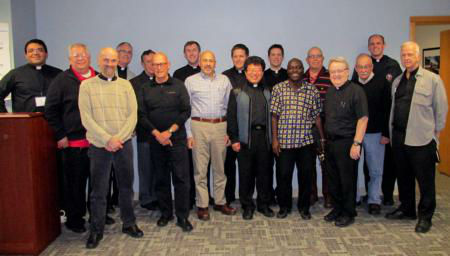Parochial vicar training
Last week, 18 parochial vicars spent three days at the Pastoral Center for training with the Office for Lifelong Faith Formation and Parish Support, the Catholic Leadership Institute (CLI) and the Office of Pastoral Planning. The training will assist them as they serve in Phase II collaborative parishes. The group included two recently ordained priests and seven priests with service ranging from 29 to 47 years. Some of the longer-serving priests had been pastors and are now priests in a collaborative. The training had two components: evangelization and leadership. Bishop Arthur Kennedy, episcopal vicar for New Evangelization welcomed the group. Janet Benestad, cabinet secretary for New Evangelization and Faith Formation, and Father Paul Soper, director of the Office of Pastoral Planning also offered greetings.
Bishop Kennedy reminded the priests that the collaborative structure is important, but "what is more important is our interior life." He noted that, "there is today a pneumapathology -- a disease of the spirit. ... Evangelization is fundamental, as is the need to re-awaken people's souls to Christ." He tasked the parochial vicars with finding ways to "bring the mystery of God into people's existence." Highlighting this point he paraphrased author Flannery O'Connor: "the Church will be the only thing that can save the world from itself."
Patrick Krisak, director of Parish Support and Training facilitated the first day assisted by team members Amber Ezeani, Kathryn Boyle, and Tom Lyman. Mid-morning prayer and adoration were built into the schedule which included defining and describing the new evangelization, describing what an evangelizing parish looks like, and strategies to move committed Catholics to intentional discipleship. Also discussed was the oftentimes untapped potential for adult faith formation in parish "gateway moments" -- those times when "people come to us seeking something that only the Church can give" such as sacramental preparation. Suggestions for resources and strategies were offered at break-neck pace prompting one parochial vicar to give an encouraging cheer: "Keep going, Patrick, you're on fire, this is great!"
Days two and three provided executive support built on the shared wisdom of the priests.
Denise Ehlen from CLI facilitated these days. Following an opening prayer to the Holy Spirit, the group examined some definitions and models of leadership. Understanding the structure of the parish led to a reflection on the implementation of Disciples in Mission. In his remarks, Father Soper said "Retooling for evangelization is a permanent reality; collaboratives are not a permanent reality. Our desire and hope is that (in the future) the collaboratives vanish and we have 289 parishes each with their own pastor."
Asked to describe the collaborative team, one experienced parochial vicar said, "Strengths are multiplied and weaknesses are made irrelevant" and another offered his observation, "United, excited, and committed." They compared and contrasted their past and present parish experience and were frank about life four months into Phase II, one admitting that he sometimes feels that he is on an "emotional roller coaster" trying to manage schedules and tasks. There was worry that the reliance on technology and electronic communication can be a challenge for the less tech-savvy. Many shared the feeling that the lack of ability to maintain "equal presence" between or among the communities, could potentially, but incorrectly, give rise to a "you like them better than us" perspective. The vicars expressed concern about becoming a "sacramental functionary" with less opportunity to interact with communities. A question about the nature of being part of a team flowed into a more focused question of how being part of a collaborative team shapes or effects the teaching, sanctifying, and governing offices of priesthood, and, in light of this, what needs further clarification from the pastor?
Psalm 139 tells us that we are "fearfully, wonderfully made." Indeed. However, people can be complicated beings. Part of training involved looking at case studies through the lens of behavior dispositions. This exercise was designed to build confidence in addressing situations that may arise in the collaborative. Time was also given to examining constraints that can hinder moving forward. Some constraints are real, others are assumed. One priest offered the suggestion that, whether a constraint is real or assumed, there is a need to "Work like you're going to be there (in the collaborative) forever -- even though you could be moved tomorrow."
Representatives from Parish Services -- finance, real estate, and human resources -- joined the group on day three to speak about the services their offices provide to collaboratives.
At the end of the week, Ehlen of CLI pointed out that these 18 men have a unique role as part of Phase II, "Their leadership and collaboration will shape future collaboratives."
We pray in gratitude for these parochial vicars and the good work they are doing.
Susan Abbott is Coordinator of Parish Outreach for the Archdiocese of Boston's Office of Pastoral Planning.
- SUSAN ABBOTT IS EVANGELIZATION ASSOCIATE, OUR LADY OF GOOD VOYAGE SHRINE.



















